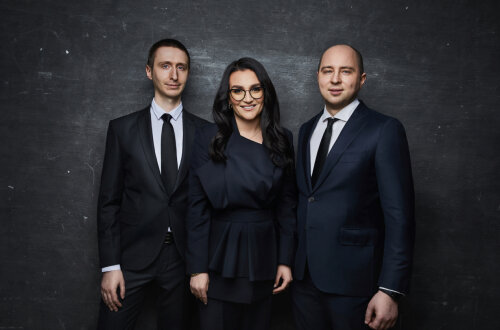Best Child Custody Lawyers in Klaipėda
Share your needs with us, get contacted by law firms.
Free. Takes 2 min.
Free Guide to Hiring a Family Lawyer
List of the best lawyers in Klaipėda, Republic of Lithuania
About Child Custody Law in Klaipėda, Republic of Lithuania
Child custody law in Klaipėda, as throughout the Republic of Lithuania, is governed by national legislation. The Lithuanian Civil Code and related legal acts set out the rights and responsibilities of parents and guardians concerning the care and upbringing of minors. Child custody disputes can arise as a result of divorce, separation, or situations where parents are unable to agree on living arrangements and decision-making authority regarding their children. The primary consideration of the courts in Klaipėda, and across Lithuania, is always the best interest of the child.
Why You May Need a Lawyer
Legal assistance is often critical in child custody matters due to the sensitivity and complexity of the issues involved. You may need a lawyer if:
- You are separating or divorcing and cannot agree with the other parent regarding child custody arrangements.
- There are concerns about the child's safety or welfare with the other parent.
- You wish to modify an existing custody agreement due to changed circumstances.
- You are a non-parent (relative, guardian, or other) seeking custody or visitation rights.
- There are cross-border or international elements, such as relocation or abduction concerns.
- The other party has hired legal representation.
A lawyer can help you understand your rights, prepare the necessary documents, represent you in negotiations or court, and ensure that your child’s best interests are protected throughout the legal process.
Local Laws Overview
In Klaipėda, child custody is subject to the provisions of the Lithuanian Civil Code. The law recognizes two main forms of custody: sole custody, where one parent has primary responsibility, and joint custody, where both parents share responsibility. Courts generally prefer joint custody arrangements that enable both parents to participate in the child's upbringing, unless one parent poses a risk to the child's well-being.
Key aspects of the law include:
- All decisions concerning custody are made in the best interest of the child.
- Children have the right to maintain personal relationships and direct contact with both parents, unless restricted by the court for their safety.
- Parents are expected to reach an agreement on custody and residence; if they cannot, the court will decide.
- Children who are mature enough may express their opinion regarding custody preference; the court will take this into account.
- The court can involve social services to assess the child’s living conditions and parental capabilities.
- Relocation with a child may require the consent of both parents or approval by the court.
- Modification of custody arrangements is possible if there is a significant change in circumstances affecting the child.
Frequently Asked Questions
What does the court consider when deciding child custody in Klaipėda?
The court’s main consideration is the best interest of the child, including emotional bonds, the ability of each parent to care for the child, the child’s age and needs, and any risks to the child’s safety or welfare.
Can both parents have joint custody?
Yes, the court encourages joint custody whenever it serves the child’s best interests. Both parents will share rights and responsibilities in raising the child.
How does the court view the child’s preferences?
If a child is mature enough, the court will listen to and consider their preferences about where and with whom they wish to live.
What if parents cannot agree on custody arrangements?
If parents cannot come to an agreement, the court will make a determination based on evidence and the child’s best interests.
Can custody agreements be changed later?
Yes, custody orders can be modified if there are significant changes in circumstances, such as one parent moving, changes in the child’s needs, or issues related to the child’s welfare.
Is mediation required before going to court?
While not always required, courts often encourage mediation to help parents reach an agreement outside of court. This is seen as less stressful for both parents and children.
Can grandparents or other relatives apply for custody?
Under certain circumstances, such as the inability of both parents to care for the child, relatives may seek custody or visitation rights through the court.
Is it possible for a parent to move abroad with a child?
Relocation with a child outside Lithuania generally requires the consent of the other parent or, failing that, the approval of the court.
What happens if a parent violates custody agreements?
Failure to follow court-ordered custody arrangements can result in legal consequences, including modification of custody and, in serious cases, criminal liability.
Do I need a lawyer to handle my child custody case?
While not mandatory, having a lawyer is strongly recommended due to the complexity of child custody matters and the importance of protecting your rights and your child’s welfare.
Additional Resources
If you are seeking information or support regarding child custody in Klaipėda, you may find these resources helpful:
- State Child Rights Protection and Adoption Service (Valstybės vaiko teisių apsaugos ir įvaikinimo tarnyba) - Offers guidance on child protection and welfare issues.
- Klaipėda Municipality Social Services Department - Provides social assistance and family support services.
- District Court of Klaipėda City - Handles family law and child custody cases.
- Legal Aid Services, Klaipėda - For those eligible, free or subsidized legal assistance can be sought.
Next Steps
If you need legal assistance with a child custody matter in Klaipėda, consider the following steps:
- Contact a qualified family law lawyer who has experience with child custody cases in Klaipėda.
- Gather all relevant documentation, such as your child’s birth certificate, medical records, correspondence with the other parent, and any existing court orders.
- If possible, attempt to reach an amicable agreement with the other parent regarding custody, perhaps with the help of a mediator.
- Visit the local court or legal aid office for guidance on filing a custody application or response.
- Utilize government and social services for additional support during the process.
Prioritizing the best interests of your child is key. Seek professional guidance early to ensure your rights and your child’s well-being are fully protected.
Lawzana helps you find the best lawyers and law firms in Klaipėda through a curated and pre-screened list of qualified legal professionals. Our platform offers rankings and detailed profiles of attorneys and law firms, allowing you to compare based on practice areas, including Child Custody, experience, and client feedback.
Each profile includes a description of the firm's areas of practice, client reviews, team members and partners, year of establishment, spoken languages, office locations, contact information, social media presence, and any published articles or resources. Most firms on our platform speak English and are experienced in both local and international legal matters.
Get a quote from top-rated law firms in Klaipėda, Republic of Lithuania — quickly, securely, and without unnecessary hassle.
Disclaimer:
The information provided on this page is for general informational purposes only and does not constitute legal advice. While we strive to ensure the accuracy and relevance of the content, legal information may change over time, and interpretations of the law can vary. You should always consult with a qualified legal professional for advice specific to your situation.
We disclaim all liability for actions taken or not taken based on the content of this page. If you believe any information is incorrect or outdated, please contact us, and we will review and update it where appropriate.














